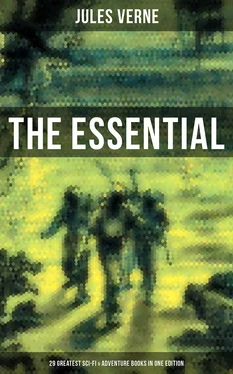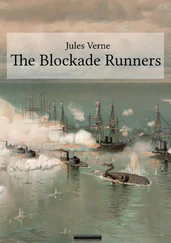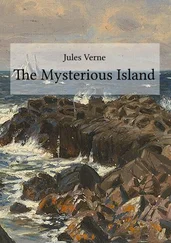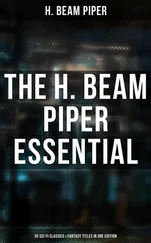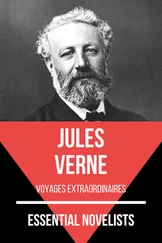A GUIDE FOUND TO THE CENTRE OF THE EARTH
Table of Contents
In the evening I took a short walk on the beach and returned at night to my plank-bed, where I slept soundly all night.
When I awoke I heard my uncle talking at a great rate in the next room. I immediately dressed and joined him.
He was conversing in the Danish language with a tall man, of robust build. This fine fellow must have been possessed of great strength. His eyes, set in a large and ingenuous face, seemed to me very intelligent; they were of a dreamy sea-blue. Long hair, which would have been called red even in England, fell in long meshes upon his broad shoulders. The movements of this native were lithe and supple; but he made little use of his arms in speaking, like a man who knew nothing or cared nothing about the language of gestures. His whole appearance bespoke perfect calmness and self-possession, not indolence but tranquillity. It was felt at once that he would be beholden to nobody, that he worked for his own convenience, and that nothing in this world could astonish or disturb his philosophic calmness.
I caught the shades of this Icelander’s character by the way in which he listened to the impassioned flow of words which fell from the Professor. He stood with arms crossed, perfectly unmoved by my uncle’s incessant gesticulations. A negative was expressed by a slow movement of the head from left to right, an affirmative by a slight bend, so slight that his long hair scarcely moved. He carried economy of motion even to parsimony.
Certainly I should never have dreamt in looking at this man that he was a hunter; he did not look likely to frighten his game, nor did he seem as if he would even get near it. But the mystery was explained when M. Fridrikssen informed me that this tranquil personage was only a hunter of the eider duck, whose under plumage constitutes the chief wealth of the island. This is the celebrated eider down, and it requires no great rapidity of movement to get it.
Early in summer the female, a very pretty bird, goes to build her nest among the rocks of the fiords with which the coast is fringed. After building the nest she feathers it with down plucked from her own breast. Immediately the hunter, or rather the trader, comes and robs the nest, and the female recommences her work. This goes on as long as she has any down left. When she has stripped herself bare the male takes his turn to pluck himself. But as the coarse and hard plumage of the male has no commercial value, the hunter does not take the trouble to rob the nest of this; the female therefore lays her eggs in the spoils of her mate, the young are hatched, and next year the harvest begins again.
Now, as the eider duck does not select steep cliffs for her nest, but rather the smooth terraced rocks which slope to the sea, the Icelandic hunter might exercise his calling without any inconvenient exertion. He was a farmer who was not obliged either to sow or reap his harvest, but merely to gather it in.
This grave, phlegmatic, and silent individual was called Hans Bjelke; and he came recommended by M. Fridrikssen. He was our future guide. His manners were a singular contrast with my uncle’s.
Nevertheless, they soon came to understand each other. Neither looked at the amount of the payment: the one was ready to accept whatever was offered; the other was ready to give whatever was demanded. Never was bargain more readily concluded.
The result of the treaty was, that Hans engaged on his part to conduct us to the village of Stapi, on the south shore of the Snæfell peninsula, at the very foot of the volcano. By land this would be about twenty-two miles, to be done, said my uncle, in two days.
But when he learnt that the Danish mile was 24,000 feet long, he was obliged to modify his calculations and allow seven or eight days for the march.
Four horses were to be placed at our disposal - two to carry him and me, two for the baggage. Hams, as was his custom, would go on foot. He knew all that part of the coast perfectly, and promised to take us the shortest way.
His engagement was not to terminate with our arrival at Stapi; he was to continue in my uncle’s service for the whole period of his scientific researches, for the remuneration of three rixdales a week (about twelve shillings), but it was an express article of the covenant that his wages should be counted out to him every Saturday at six o’clock in the evening, which, according to him, was one indispensable part of the engagement.
The start was fixed for the 16th of June. My uncle wanted to pay the hunter a portion in advance, but he refused with one word:
“ Efter, ” said he.
“After,” said the Professor for my edification.
The treaty concluded, Hans silently withdrew.
“A famous fellow,” cried my uncle; “but he little thinks of the marvellous part he has to play in the future.”
“So he is to go with us as far as —”
“As far as the centre of the earth, Axel.”
Forty-eight hours were left before our departure; to my great regret I had to employ them in preparations; for all our ingenuity was required to pack every article to the best advantage; instruments here, arms there, tools in this package, provisions in that: four sets of packages in all.
The instruments were:
1 An Eigel’s centigrade thermometer, graduated up to 150 degrees (302 degrees Fahr.), which seemed to me too much or too little. Too much if the internal heat was to rise so high, for in this case we should be baked, not enough to measure the temperature of springs or any matter in a state of fusion.
2 An aneroid barometer, to indicate extreme pressures of the atmosphere. An ordinary barometer would not have answered the purpose, as the pressure would increase during our descent to a point which the mercurial barometer [7]would not register.
3 A chronometer, made by Boissonnas, jun., of Geneva, accurately set to the meridian of Hamburg.
4 Two compasses, viz., a common compass and a dipping needle.
5 A night glass.
6 Two of Ruhmkorff’s apparatus, which, by means of an electric current, supplied a safe and handy portable light [8]
The arms consisted of two of Purdy’s rifles and two brace of pistols. But what did we want arms for? We had neither savages nor wild beasts to fear, I supposed. But my uncle seemed to believe in his arsenal as in his instruments, and more especially in a considerable quantity of gun cotton, which is unaffected by moisture, and the explosive force of which exceeds that of gunpowder.
The tools comprised two pickaxes, two spades, a silk ropeladder, three iron-tipped sticks, a hatchet, a hammer, a dozen wedges and iron spikes, and a long knotted rope. Now this was a large load, for the ladder was 300 feet long.
And there were provisions too: this was not a large parcel, but it was comforting to know that of essence of beef and biscuits there were six months’ consumption. Spirits were the only liquid, and of water we took none; but we had flasks, and my uncle depended on springs from which to fill them. Whatever objections I hazarded as to their quality, temperature, and even absence, remained ineffectual.
To complete the exact inventory of all our travelling accompaniments, I must not forget a pocket medicine chest, containing blunt scissors, splints for broken limbs, a piece of tape of unbleached linen, bandages and compresses, lint, a lancet for bleeding, all dreadful articles to take with one. Then there was a row of phials containing dextrine, alcoholic ether, liquid acetate of lead, vinegar, and ammonia drugs which afforded me no comfort. Finally, all the articles needful to supply Ruhmkorff’s apparatus.
My uncle did not forget-a supply of tobacco, coarse grained powder, and amadou, nor a leathern belt in which he carried a sufficient quantity of gold, silver, and paper money. Six pairs of boots and shoes, made waterproof with a composition of indiarubber and naphtha, were packed amongst the tools.
Читать дальше
